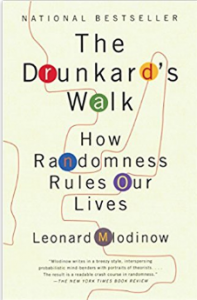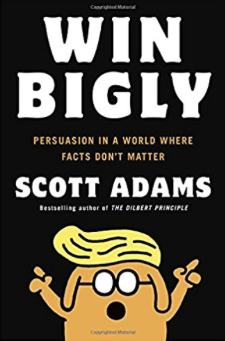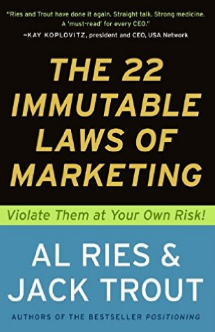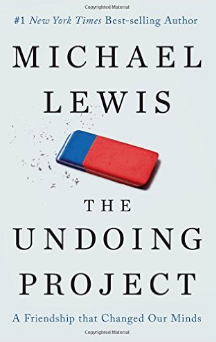I recently read “The Drunkard’s Walk: How Randomness Rules Our Lives” by Leonard Mlodinow. Below are the quotes I found most interesting. If you like them, buy and read the book.
 “The human mind is built to identify for each event a definite cause and can therefore have a hard time accepting the influence of unrelated or random factors.” (xi)
“The human mind is built to identify for each event a definite cause and can therefore have a hard time accepting the influence of unrelated or random factors.” (xi)
“Successful people in every field are almost universally members of a certain set – the set of people who don’t give up.” (11)
“We should expect, by chance alone, about 1 in 10 of the CEOs to have five winning or losing years in a row.” (100)
“It is more reliable to judge people by analyzing their abilities than by glancing at the scoreboard.” (100)
“Voting is also a kind of measurement. In that case we are measuring not simply how many people support each candidate on election day but how many care enough to take the trouble to vote.” (1260
“Studies have shown that even flavor-trained professionals can rarely reliably identify more than three or four components in a mixture.” (132)
“In the months after the attacks of September 11, 2001, when travelers, afraid to take airplanes, suddenly switched to cars. Their fear translated into about 1,000 more highway fatalities in that period than in the same period the year before – hidden casualties of the September 11 attack.” (159)
“Because the myriad of foreseeable and chance obstacles that must be overcome to complete a task of any complexity, the connection between ability and accomplishment is far less direct than anything that can possibly be explained by Galton’s ideas (of genetics).” (161)
“Psychologists have found that the ability to persist in the face of obstacles is at least as important a factor in success as talent.” (161)
“Events whose patterns appear to have a definite cause may actually be the product of chance.” (173)
“One of the most beneficial things we can do for ourselves is to look for ways to exercise control over our lives – or at least to look for ways that help us feel that we do.” (185)
“If events are random, we are not in control, and if we are in control of events, they are not random. There is therefore a fundamental clash between our need to feel we are in control and our ability to recognize randomness. That clash is one of the principal reasons we misinterpret random events.” (186)
“Although statistical regularities can be found in social data, the future of particular individuals is impossible to predict, and for our particular achievements, our jobs, our friends, our finances, we all owe more to chance than many people realize.” (195)
“We can focus on the ability to react to events rather than relying on the ability to predict them, on qualities like flexibility, confidence, courage and perseverance. And we can place more importance on our direct impressions of people thanon their well-trumpeted past accomplishments.” (203)
“In complex systems (among which I count our lives) we should expect that minor factors we can usually ignore will by chance sometimes cause major incidents.” (204)
“That is the deterministic view of the marketplace, a view in which it is mainly the intrinsic qualities of the person or the product that governs success. But there is another way to look at it, a nondeterministic view. In this view there are many high-quality but unknown books, singers, actors, and what makes on or another come to stand out is largely a conspiracy of random and minor factors – that is, luck.” (205)
“Realizing that “few people would engage in extended activity if they believe that there were a random connection between what they did and the rewards they received,” Lerner concluded that “for the sake of their own sanity,” people overestimate the degree to which ability can be inferred from success.” (210)
“We tend to see what we expect to see. We in effect define degree of talent by degree of success and then reinforce our feelings of causality by noting the correlation. That’s why although there is sometimes little difference in ability between a wildly successful person and one who is not as successful, there is usually a big difference in how they are viewed.” (212)
“Thomas Edison observed that “many of life’s failures are people who did not realize how close they were to success when they gave up.” (216)
“What I’ve learned, above all, is to keep marching forward because the best news is that since chance does play a role, one important factor in success is under our control: the number of at bats, the number of chances taken, the number of opportunities seized. For even a coin weighted toward failure will sometimes land on success. Or as the IBM pioneer Thomas Watson said, “If you want to succeed, double your failure rate.” (217)
Liked the quotes? Buy the book.





